Shuyue Stella Li
Privasis: Synthesizing the Largest "Public" Private Dataset from Scratch
Feb 03, 2026Abstract:Research involving privacy-sensitive data has always been constrained by data scarcity, standing in sharp contrast to other areas that have benefited from data scaling. This challenge is becoming increasingly urgent as modern AI agents--such as OpenClaw and Gemini Agent--are granted persistent access to highly sensitive personal information. To tackle this longstanding bottleneck and the rising risks, we present Privasis (i.e., privacy oasis), the first million-scale fully synthetic dataset entirely built from scratch--an expansive reservoir of texts with rich and diverse private information--designed to broaden and accelerate research in areas where processing sensitive social data is inevitable. Compared to existing datasets, Privasis, comprising 1.4 million records, offers orders-of-magnitude larger scale with quality, and far greater diversity across various document types, including medical history, legal documents, financial records, calendars, and text messages with a total of 55.1 million annotated attributes such as ethnicity, date of birth, workplace, etc. We leverage Privasis to construct a parallel corpus for text sanitization with our pipeline that decomposes texts and applies targeted sanitization. Our compact sanitization models (<=4B) trained on this dataset outperform state-of-the-art large language models, such as GPT-5 and Qwen-3 235B. We plan to release data, models, and code to accelerate future research on privacy-sensitive domains and agents.
Collaborative Multi-Agent Test-Time Reinforcement Learning for Reasoning
Jan 15, 2026Abstract:Multi-agent systems have evolved into practical LLM-driven collaborators for many applications, gaining robustness from diversity and cross-checking. However, multi-agent RL (MARL) training is resource-intensive and unstable: co-adapting teammates induce non-stationarity, and rewards are often sparse and high-variance. Therefore, we introduce \textbf{Multi-Agent Test-Time Reinforcement Learning (MATTRL)}, a framework that injects structured textual experience into multi-agent deliberation at inference time. MATTRL forms a multi-expert team of specialists for multi-turn discussions, retrieves and integrates test-time experiences, and reaches consensus for final decision-making. We also study credit assignment for constructing a turn-level experience pool, then reinjecting it into the dialogue. Across challenging benchmarks in medicine, math, and education, MATTRL improves accuracy by an average of 3.67\% over a multi-agent baseline, and by 8.67\% over comparable single-agent baselines. Ablation studies examine different credit-assignment schemes and provide a detailed comparison of how they affect training outcomes. MATTRL offers a stable, effective and efficient path to distribution-shift-robust multi-agent reasoning without tuning.
Olmo 3
Dec 15, 2025Abstract:We introduce Olmo 3, a family of state-of-the-art, fully-open language models at the 7B and 32B parameter scales. Olmo 3 model construction targets long-context reasoning, function calling, coding, instruction following, general chat, and knowledge recall. This release includes the entire model flow, i.e., the full lifecycle of the family of models, including every stage, checkpoint, data point, and dependency used to build it. Our flagship model, Olmo 3 Think 32B, is the strongest fully-open thinking model released to-date.
RLVE: Scaling Up Reinforcement Learning for Language Models with Adaptive Verifiable Environments
Nov 10, 2025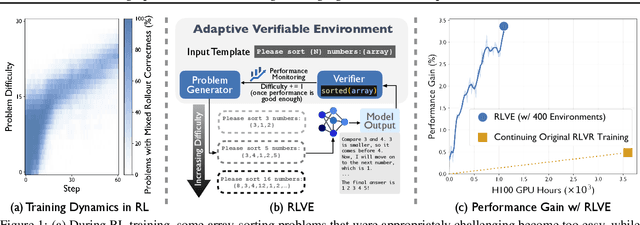

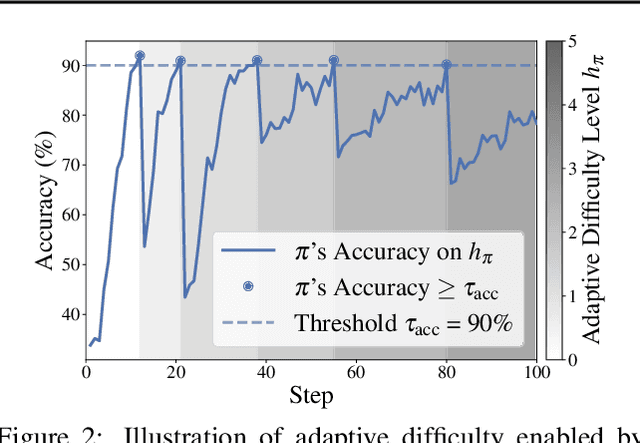
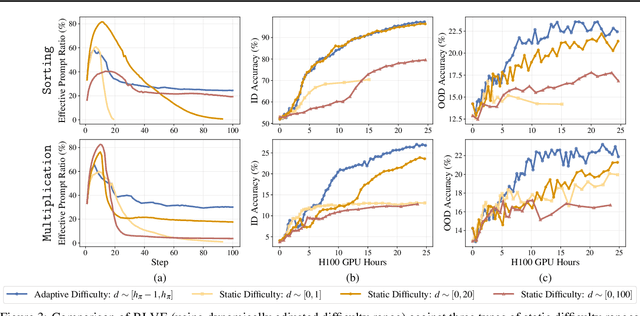
Abstract:We introduce Reinforcement Learning (RL) with Adaptive Verifiable Environments (RLVE), an approach using verifiable environments that procedurally generate problems and provide algorithmically verifiable rewards, to scale up RL for language models (LMs). RLVE enables each verifiable environment to dynamically adapt its problem difficulty distribution to the policy model's capabilities as training progresses. In contrast, static data distributions often lead to vanishing learning signals when problems are either too easy or too hard for the policy. To implement RLVE, we create RLVE-Gym, a large-scale suite of 400 verifiable environments carefully developed through manual environment engineering. Using RLVE-Gym, we show that environment scaling, i.e., expanding the collection of training environments, consistently improves generalizable reasoning capabilities. RLVE with joint training across all 400 environments in RLVE-Gym yields a 3.37% absolute average improvement across six reasoning benchmarks, starting from one of the strongest 1.5B reasoning LMs. By comparison, continuing this LM's original RL training yields only a 0.49% average absolute gain despite using over 3x more compute. We release our code publicly.
PrefPalette: Personalized Preference Modeling with Latent Attributes
Jul 17, 2025



Abstract:Personalizing AI systems requires understanding not just what users prefer, but the reasons that underlie those preferences - yet current preference models typically treat human judgment as a black box. We introduce PrefPalette, a framework that decomposes preferences into attribute dimensions and tailors its preference prediction to distinct social community values in a human-interpretable manner. PrefPalette operationalizes a cognitive science principle known as multi-attribute decision making in two ways: (1) a scalable counterfactual attribute synthesis step that involves generating synthetic training data to isolate for individual attribute effects (e.g., formality, humor, cultural values), and (2) attention-based preference modeling that learns how different social communities dynamically weight these attributes. This approach moves beyond aggregate preference modeling to capture the diverse evaluation frameworks that drive human judgment. When evaluated on 45 social communities from the online platform Reddit, PrefPalette outperforms GPT-4o by 46.6% in average prediction accuracy. Beyond raw predictive improvements, PrefPalette also shed light on intuitive, community-specific profiles: scholarly communities prioritize verbosity and stimulation, conflict-oriented communities value sarcasm and directness, and support-based communities emphasize empathy. By modeling the attribute-mediated structure of human judgment, PrefPalette delivers both superior preference modeling and transparent, interpretable insights, and serves as a first step toward more trustworthy, value-aware personalized applications.
Spurious Rewards: Rethinking Training Signals in RLVR
Jun 12, 2025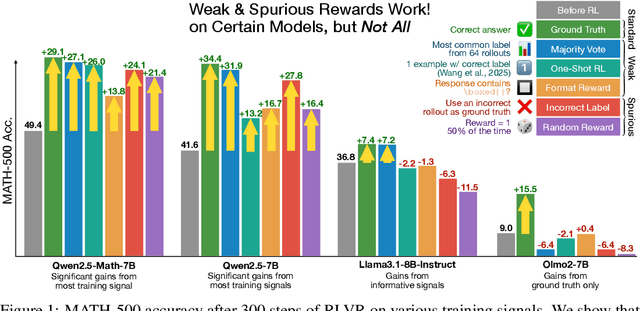


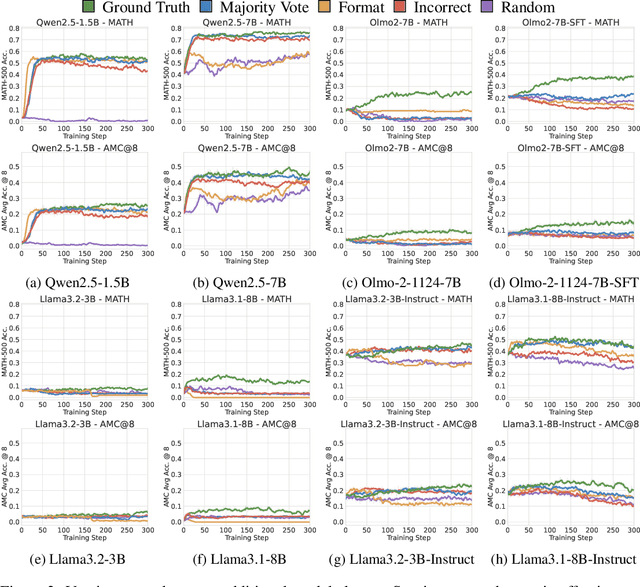
Abstract:We show that reinforcement learning with verifiable rewards (RLVR) can elicit strong mathematical reasoning in certain models even with spurious rewards that have little, no, or even negative correlation with the correct answer. For example, RLVR improves MATH-500 performance for Qwen2.5-Math-7B in absolute points by 21.4% (random reward), 13.8% (format reward), 24.1% (incorrect label), 26.0% (1-shot RL), and 27.1% (majority voting) -- nearly matching the 29.1% gained with ground truth rewards. However, the spurious rewards that work for Qwen often fail to yield gains with other model families like Llama3 or OLMo2. In particular, we find code reasoning -- thinking in code without actual code execution -- to be a distinctive Qwen2.5-Math behavior that becomes significantly more frequent after RLVR, from 65% to over 90%, even with spurious rewards. Overall, we hypothesize that, given the lack of useful reward signal, RLVR must somehow be surfacing useful reasoning representations learned during pretraining, although the exact mechanism remains a topic for future work. We suggest that future RLVR research should possibly be validated on diverse models rather than a single de facto choice, as we show that it is easy to get significant performance gains on Qwen models even with completely spurious reward signals.
Precise Information Control in Long-Form Text Generation
Jun 06, 2025Abstract:A central challenge in modern language models (LMs) is intrinsic hallucination: the generation of information that is plausible but unsubstantiated relative to input context. To study this problem, we propose Precise Information Control (PIC), a new task formulation that requires models to generate long-form outputs grounded in a provided set of short self-contained statements, known as verifiable claims, without adding any unsupported ones. For comprehensiveness, PIC includes a full setting that tests a model's ability to include exactly all input claims, and a partial setting that requires the model to selectively incorporate only relevant claims. We present PIC-Bench, a benchmark of eight long-form generation tasks (e.g., summarization, biography generation) adapted to the PIC setting, where LMs are supplied with well-formed, verifiable input claims. Our evaluation of a range of open and proprietary LMs on PIC-Bench reveals that, surprisingly, state-of-the-art LMs still intrinsically hallucinate in over 70% of outputs. To alleviate this lack of faithfulness, we introduce a post-training framework, using a weakly supervised preference data construction method, to train an 8B PIC-LM with stronger PIC ability--improving from 69.1% to 91.0% F1 in the full PIC setting. When integrated into end-to-end factual generation pipelines, PIC-LM improves exact match recall by 17.1% on ambiguous QA with retrieval, and factual precision by 30.5% on a birthplace verification task, underscoring the potential of precisely grounded generation.
BehaviorSFT: Behavioral Token Conditioning for Clinical Agents Across the Proactivity Spectrum
May 27, 2025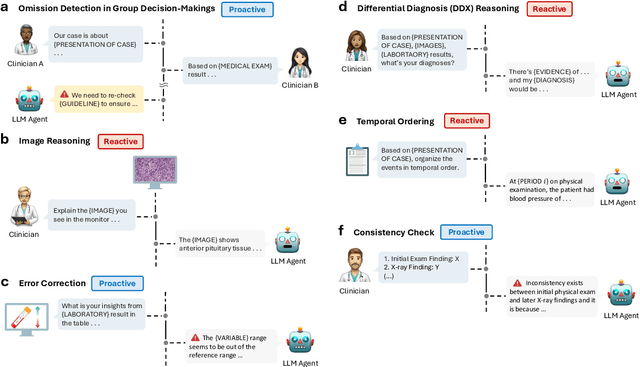

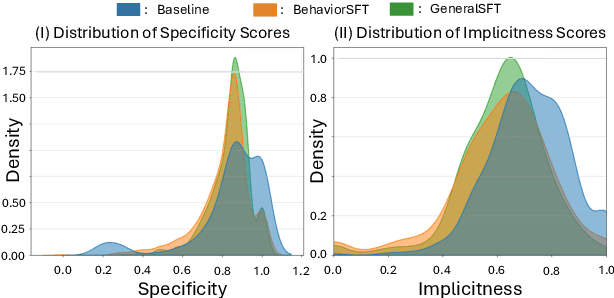
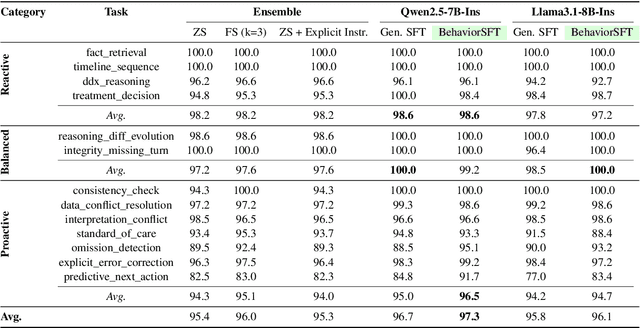
Abstract:Large Language Models (LLMs) as clinical agents require careful behavioral adaptation. While adept at reactive tasks (e.g., diagnosis reasoning), LLMs often struggle with proactive engagement, like unprompted identification of critical missing information or risks. We introduce BehaviorBench, a comprehensive dataset to evaluate agent behaviors across a clinical assistance spectrum, ranging from reactive query responses to proactive interventions (e.g., clarifying ambiguities, flagging overlooked critical data). Our BehaviorBench experiments reveal LLMs' inconsistent proactivity. To address this, we propose BehaviorSFT, a novel training strategy using behavioral tokens to explicitly condition LLMs for dynamic behavioral selection along this spectrum. BehaviorSFT boosts performance, achieving up to 97.3% overall Macro F1 on BehaviorBench and improving proactive task scores (e.g., from 95.0% to 96.5% for Qwen2.5-7B-Ins). Crucially, blind clinician evaluations confirmed BehaviorSFT-trained agents exhibit more realistic clinical behavior, striking a superior balance between helpful proactivity (e.g., timely, relevant suggestions) and necessary restraint (e.g., avoiding over-intervention) versus standard fine-tuning or explicit instructed agents.
BLAB: Brutally Long Audio Bench
May 05, 2025Abstract:Developing large audio language models (LMs) capable of understanding diverse spoken interactions is essential for accommodating the multimodal nature of human communication and can increase the accessibility of language technologies across different user populations. Recent work on audio LMs has primarily evaluated their performance on short audio segments, typically under 30 seconds, with limited exploration of long-form conversational speech segments that more closely reflect natural user interactions with these models. We introduce Brutally Long Audio Bench (BLAB), a challenging long-form audio benchmark that evaluates audio LMs on localization, duration estimation, emotion, and counting tasks using audio segments averaging 51 minutes in length. BLAB consists of 833+ hours of diverse, full-length audio clips, each paired with human-annotated, text-based natural language questions and answers. Our audio data were collected from permissively licensed sources and underwent a human-assisted filtering process to ensure task compliance. We evaluate six open-source and proprietary audio LMs on BLAB and find that all of them, including advanced models such as Gemini 2.0 Pro and GPT-4o, struggle with the tasks in BLAB. Our comprehensive analysis reveals key insights into the trade-offs between task difficulty and audio duration. In general, we find that audio LMs struggle with long-form speech, with performance declining as duration increases. They perform poorly on localization, temporal reasoning, counting, and struggle to understand non-phonemic information, relying more on prompts than audio content. BLAB serves as a challenging evaluation framework to develop audio LMs with robust long-form audio understanding capabilities.
A False Sense of Privacy: Evaluating Textual Data Sanitization Beyond Surface-level Privacy Leakage
Apr 28, 2025Abstract:Sanitizing sensitive text data typically involves removing personally identifiable information (PII) or generating synthetic data under the assumption that these methods adequately protect privacy; however, their effectiveness is often only assessed by measuring the leakage of explicit identifiers but ignoring nuanced textual markers that can lead to re-identification. We challenge the above illusion of privacy by proposing a new framework that evaluates re-identification attacks to quantify individual privacy risks upon data release. Our approach shows that seemingly innocuous auxiliary information -- such as routine social activities -- can be used to infer sensitive attributes like age or substance use history from sanitized data. For instance, we demonstrate that Azure's commercial PII removal tool fails to protect 74\% of information in the MedQA dataset. Although differential privacy mitigates these risks to some extent, it significantly reduces the utility of the sanitized text for downstream tasks. Our findings indicate that current sanitization techniques offer a \textit{false sense of privacy}, highlighting the need for more robust methods that protect against semantic-level information leakage.
 Add to Chrome
Add to Chrome Add to Firefox
Add to Firefox Add to Edge
Add to Edge